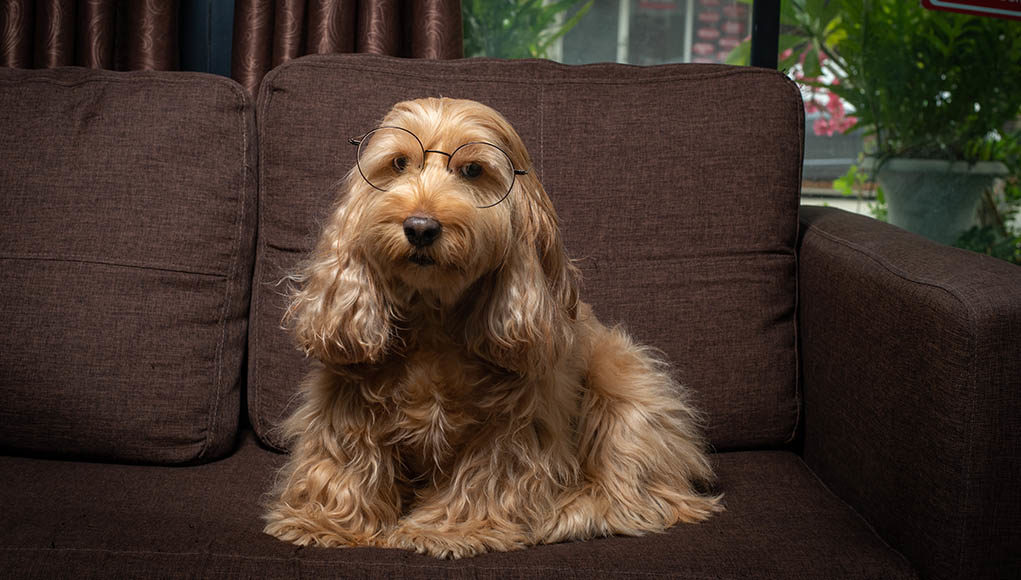Table of Contents
- 10 Smartest Mixed Dog Breeds
- Shollie (Border Collie + German Sheperd)
- Goldendoodle (Golden Retriever + Poodle)
- Rotterman (Rottweiler + Doberman Pinscher)
- Sheltie Heeler (Shetland Sheepdog + Australian Cattle Dog)
- Chiweenie (Chihuahua + Dachshund)
- Shepsky (German Shepherd + Siberian Husky)
- Labsky (Labrador Retriever + Siberian Husky)
- Cavachon (Cavalier King Charles Spaniel + Bichon Frise)
- Cockapoo (Cocker Spaniel + Poodle)
- Puggle (Pug + Beagle)
- Frequently Asked Questions About the Smartest Mixed Breed Dogs
- Smartest Mixed Dog Breed Summary
Are you planning on adopting a mixed dog breed but not quite sure what to pick? Are you looking for an intelligent and easy-to-train pup?
Well, don't worry, because we've got you covered! Today, let's tackle the smartest mixed dog breeds.
Recent studies suggest that mixed breed dogs are healthier and more intelligent than their purebred counterparts.
Mixed dog breeds are dogs with a mixture of two or more purebred dog breeds. There are now hundreds of dog breeds worldwide, and 197 of these breeds are recognized by the American Kennel Club.
Unfortunately, most mixed dog breeds didn't cut. But that doesn't mean those mixed breeds are less beautiful and less smart.
These mixed dog breeds are pretty in their own way. After all, every dog has a unique way of captivating us.
But if you want to adopt a cross breed that is smart and easy to train, or if you're looking for the smartest poodle mix, here's a list of the Smartest Mixed Dog Breeds (in no particular order).
10 Smartest Mixed Dog Breeds
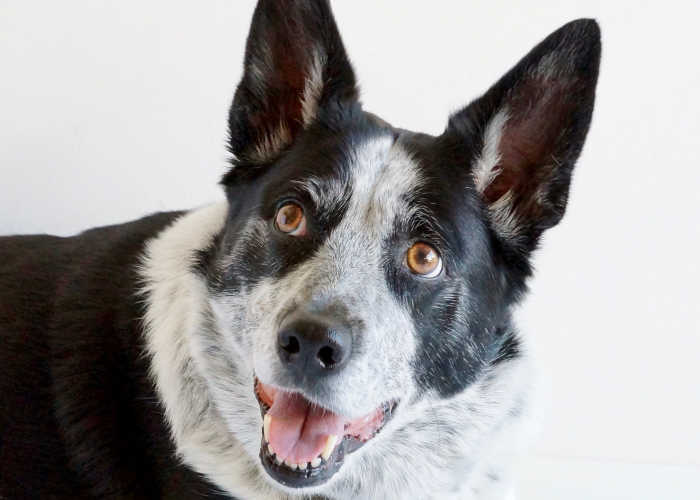
Shollie (Border Collie + German Sheperd)
Height: 21 – 29 inches
Weight: 70 – 80 pounds
Lifespan: 13 – 15 years
Temperant
Starting our list of the smartest mixed dog breeds is the Shollie.
The Shollie is an incredibly intelligent breed from its breed origin, the Border Collie and German Sheperd, which are both utility dogs known in herding groups.
These dogs have great calculation when they herd stocks and, at the same time, listen to the command of their owner.
Shollies are great as companion dogs as well. They are very affectionate to their owners and families.
They also do well with children, but of course, as a repercussion, it’s best not to leave children unsupervised.
Shollies are reserved around strangers, but once they get to familiarize themselves, they will gradually welcome them.
The Shollies are best around other dogs and animals. They’re quite playful and delightful in their presence, even cats. This temperament is developed through early socialization and exposure.
Shollies, like the Border Collie and German Sheperd, may require constant mental stimulation as they may get bored and release their unmet needs in disruptive ways.
Possible Health Problems
There are several diseases that Shollie has inherited from its breed origin.
- Bloat / Gastric Dilation Volvulus
- Cataracts
- Collie Eye Anomaly
- Exocrine Pancreatic Insufficiency
- Hip Dysplasia
- Patella Luxation
- Progressive Retinal Atrophy
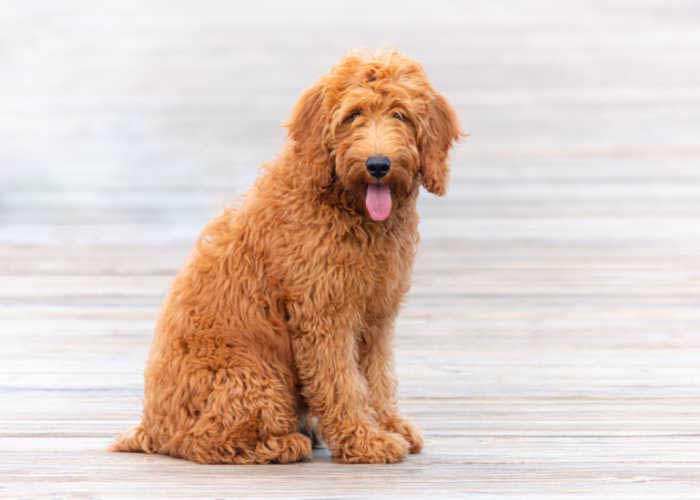
Goldendoodle (Golden Retriever + Poodle)
Height: 20-24 inches
Weight: 50-90 pounds
Lifespan: 10-15 years
Temperament
The Goldendoodle is a designer dog and is a hybrid dog breed of a Golden Retriever and a Poodle. Goldendoodle is one of the smartest poodle mixes in the world.
Goldendoodle is a positive dog breed that is affectionate, gentle, and patient, making it a great family companion.
Possible Health Problems
Goldendoodle is generally a healthy dog breed. But just like any dog, they are prone to certain illnesses. These diseases can be inherited by their dog parents.
A few of these health problems are Patellar Luxation, Hip Dysplasia, Elbow Dysplasia, Progressive Retinal Atrophy (PRA), and Von Willebrand's Disease.
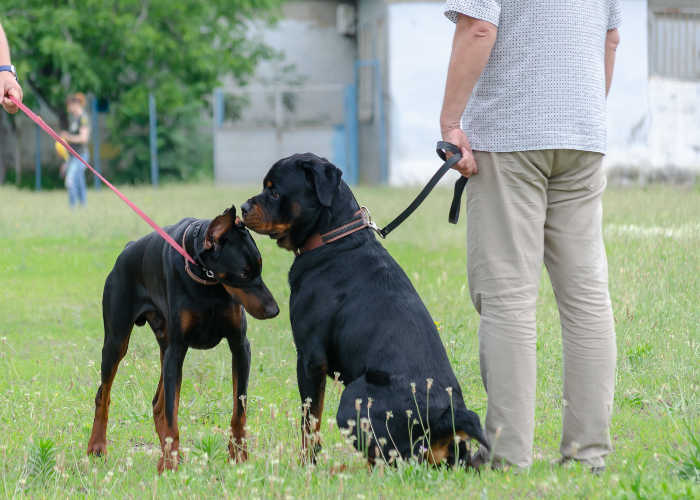
Rotterman (Rottweiler + Doberman Pinscher)
Height: 23 – 25 inches
Weight: 65 – 120 pounds
Lifespan: 9 – 12 years
Temperant
Don’t let the intimidating guise get to you first; Rotterman’s have a bigger heart. They may seem like they're out to get you with their big stature, but the only thing they’ll be getting is your love.
Rottermans are extremely affectionate. They love to be around their owner or family.
They tend to roam around their home checking up on every member of the family. Rottermans are attached to their family, even with children.
They’re quite vigilant, especially with strangers with whom they’re not familiar. They will bark as a warning to their owner and the stranger to alert them.
Fortunately, they won’t instigate harm unless the stranger displays dangerous behavior.
But owners will likely do the same if they display comfort and safety around the newcomer.
Although they are an affectionate breed, without early social exposure and interactions, Rottermans may become timid instead.
Rottermans are smart. Both of their origins are in the working group. They’re highly trainable and obedient.
Of course, as a smart breed, they have stubborn tendencies when they don’t see their owners as a leader.
Owners need to deal with Rotterman with a variety of training that is mentally challenging and command them with firmness.
Possible Health Problems
Sadly, there are several diseases that Rotterman has inherited from both its breed origin. Some are major concerns but regular checkups, prevention, and immediate attention can help.
- Bloat / Gastric Dilation Volvulus
- Cancer
- Canine Hip Dysplasia
- Joint Dysplasia
- Mitral Valve Dysplasia
- Hypothyroidism
- Von Willebrand’s Disease
- Wobbler Syndrome
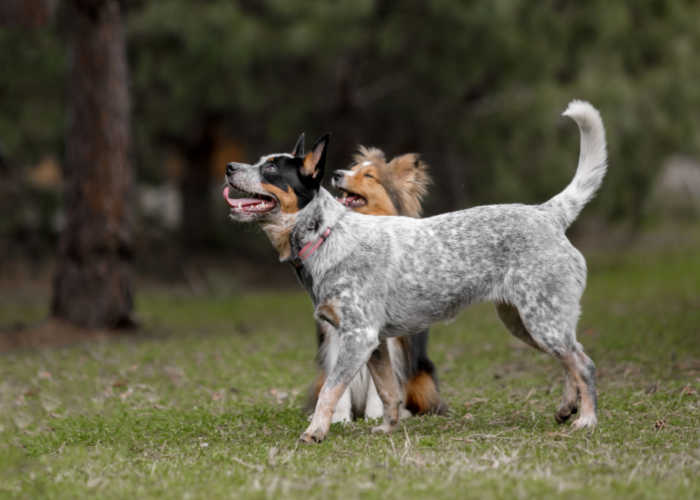
Sheltie Heeler (Shetland Sheepdog + Australian Cattle Dog)
Height: 16 – 22 inches
Weight: 25 – 50 pounds
Lifespan: 12 – 15 years
Temperant
Sheltie Heelers demand a job for them to do daily, if you don’t give them, they’ll take the matter into their brain and paws.
Sheltie Heeler is best with owners who are firm and confident with being a leader. Since they’re particular with what they want and need, they may be stubborn when it comes to training.
If they see their owner as someone confident and skillful, they’ll take up the challenge as well.
Sheltie Heelers live for the outdoor life, but that doesn't mean they should be out and about all the time. A comfy home to rest after a day’s work and play is what makes them love your company more.
These Sheltie Heelers are perfect for owners who work on the farm or any outdoor activity as they volunteer to participate. Routines and daily work are the keys to their heart.
Sheltie Heelers show their affection through their work and would want reciprocation with lots of pets and praise.
Possible Health Problems
There are several diseases that Sheltie Heeler may have inherited from both its breed origin. Determining will be done through consultation and testing during their visit with the veterinarian.
- Cataract
- Collie Eye Anomaly
- Congenital Hereditary Deafness
- Distichiasis
- Epilepsy
- Heart Problems
- Hip Dysplasia and Joint Dysplasia
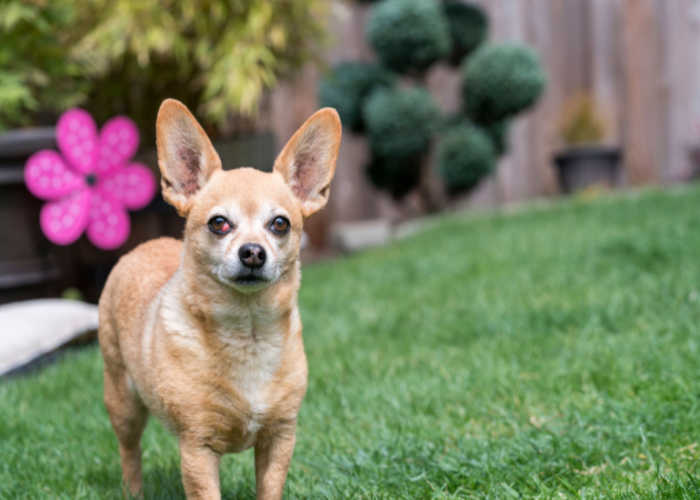
Chiweenie (Chihuahua + Dachshund)
Height: 6 – 10 inches
Weight: 5 – 12 pounds
Lifespan: 10 – 15 years
Temperant
Small in size but the energy and confidence are colossal. The Chiweenie is one of the most determined breeds out there.
Their high prey drive from their Daschund breed origin to their assertive attribute from their Chihuahua origin breed fused into one.
They may be small, but their desire to be vigilant is no joke. They’re perfect for small homes with small families or even apartment living.
A little warning about their alert notifications though. They tend to get loud whenever they want to get your attention.
Chiweenies are fast to pick up on their surroundings and respond relatively to them as well.
Chiweenies may become destructive or uncontrollable without early training and socialization. Hence, it’s best to provide them with one.
Daily walks outside and outdoor playtime may ease their eagerness to look for prey all the time, so owners should keep in mind to provide for their daily mental and physical needs.
They may not be the perfect lap dogs, though. They prefer playtime of fetch or tug of war, which isn’t bad as well. You'd love to see them in action with their little paws on the run.
Possible Health Problems
Unfortunately, there are several diseases that Chiweenies may have inherited from their breed origin.
- Allergies
- Degenerative Disc Disease
- Dental Problems
- Knee, Hip, or Joint Dysplasia
- Hypothyroidism
- Patella Luxation
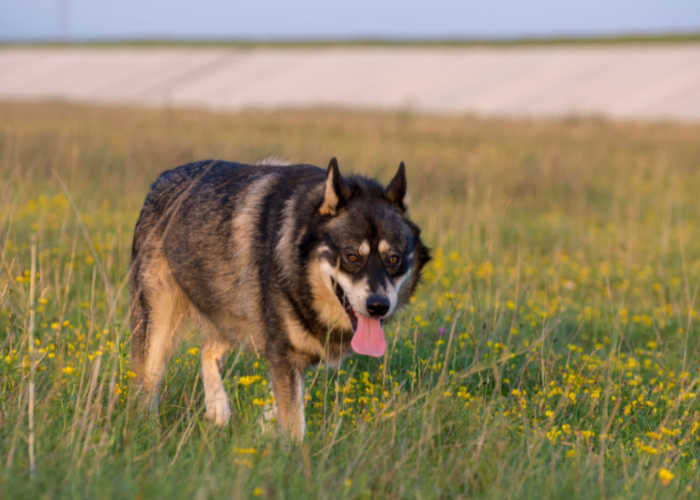
Shepsky (German Shepherd + Siberian Husky)
Height: 20 – 25 inches
Weight: 45 – 88 pounds
Lifespan: 10 – 14 years
Temperant
Shepskys are incredibly playful and energetic. They go along well with their owners and families.
They may need more supervision with children, although they're tolerant of them.
Shepskys are extremely smart and they’ll be needing extensive mental stimulation to understand that they’re not the leader of the pack most of the time.
Shepskys requires daily exercise and ongoing training. Yes, not just early training but ongoing, consistent training.
Shepsky’s is a challenge one has to take. They’re not the best option for first-time owners.
Shepskys tend to be the alpha of the household. Their witty and persistent character may discourage new owners.
Shepskys need pack leaders, and as an owner, one should be firm and confident for them.
If they have the hint that they may take over you, new owners wouldn’t probably notice that they’re taking over already.
Shepskys are natural utility dogs. They’ll excel in about everything they’re offered as long as they're trained and guided well. They’re very quick to learn and adapt to situations, too,
They’re not the best option for apartment homes. Bigger dogs require ample space for their daily necessities.
Possible Health Problems
There are several diseases that Shepskys may have inherited from their breed origin. The tests can be done before breeding to avoid litter to obtain the diseases.
- Cataracts
- Corneal Dystrophy
- Epilepsy
- Hip Dysplasia
- Patellar Luxation
- Progressive Retinal Atrophy
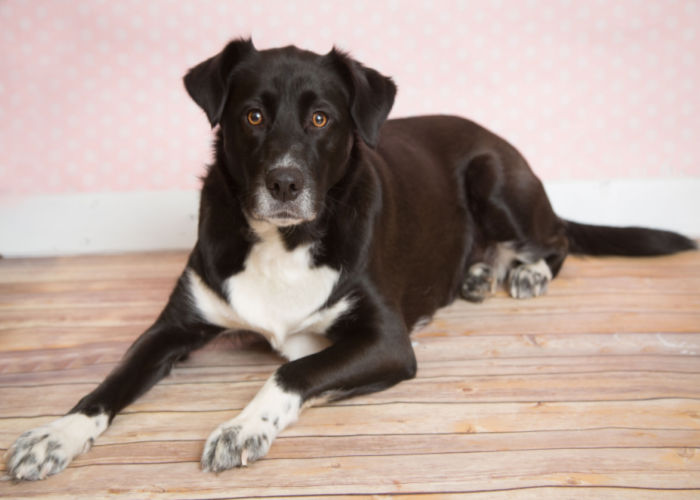
Labsky (Labrador Retriever + Siberian Husky)
Height: 20 – 28 inches
Weight: 35 -80 pounds
Lifespan: 10-12 years
Temperament
If you're looking for a combination of cuteness and intelligence, you can't go wrong with the Labsky dog breed. Labskies are affectionate and full of energy dogs.
As a dog owner, it is your job to plan activities that will stimulate your dog physically and mentally.
Huskies are known to be bored easily during training. Fortunately, it is well countered by Labrador's eagerness to please.
Possible Health Problems
A few of Labskies' possible health issues are caused by their parents. These are Hip Dysplasia, Allergies, and other eye problems.
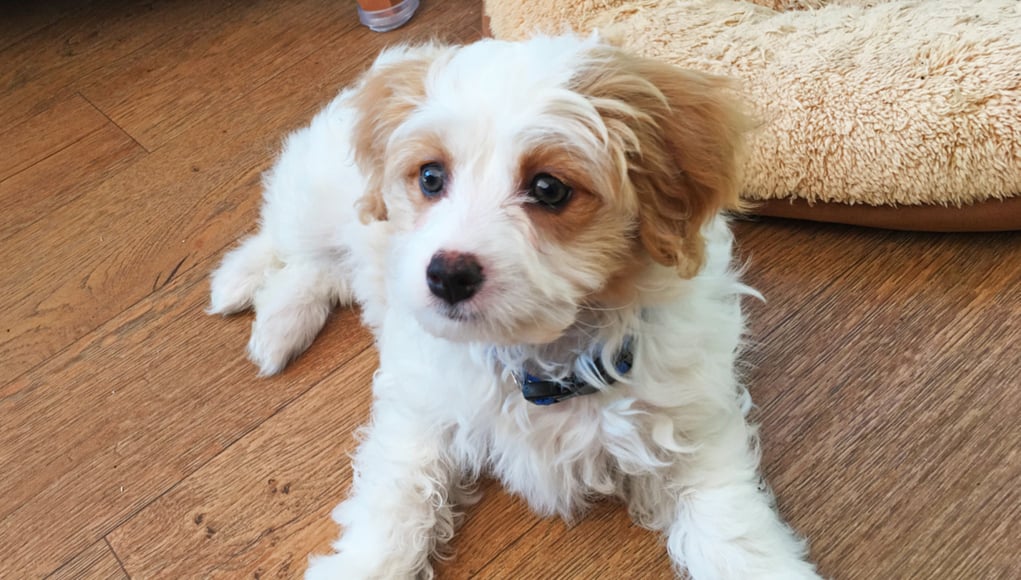
Cavachon (Cavalier King Charles Spaniel + Bichon Frise)
Height: 12 – 13 inches
Weight: 15 – 30 pounds
Lifespan: 10 – 15 years
Temperant
Cavachons are a bit of a couch potato. Although they do enjoy the company of their owners and family, they’d love the visiting pets and a few playmates. They're a great family dog, too.
Although you may not see them as much when it comes to initiating affection, they’ll welcome it with open arms when you offer one.
They're a bit playful but calm most of the time. They’re the most excited when it comes to playing with their minds.
Unlike other smart dog breeds, Cavachon does not require too much physical stimulation. Instead, they need regular and variety of mental stimulations. Cavachon’s appetite to learn is voracious.
Providing mentally challenging activities for Cavachon is a must to keep these pups happy.
They enjoy problem-solving and figuring things out on their own. It marks their dependency to ask for help.
They're great with seniors, big or small homes. They’re very easygoing with people and other animals as well.
Possible Health Problems
There are several diseases that Shollie has inherited from its breed origin.
- Allergies
- Arthritis
- Cataracts
- Degenerative Mitra Valve Disease
- Ear Infection
- Heart Murmur
- Obesity
- Patellar Luxation
- Skin Infections

Cockapoo (Cocker Spaniel + Poodle)
Height: 12-15 inches
Weight: 6 – 30 pounds (19 pounds on average)
Lifespan: 12-15 years
Temperament
Cockapoo is one of the smartest poodle mixes out there. They are not only pretty, but they are highly intelligent dogs.
Cockapoos have an outgoing nature. With proper socialization and training, they are most likely to get along and be friends with anyone they meet.
So, if you're looking for a guard dog, Cockapoos are not the best bet.
But if you're looking for a manageable-sized dog with an obedient personality and intelligent mind, the Cockapoos might be the pup for you.
Possible Health Problems
Generally, Cockapoo is a healthy dog breed. But just like any dog breed, they are prone to certain types of health problems.
That's why when it comes to adopting a new dog, it is best advised to find a reputable and responsible breeder.
The Cockapoo is a mixture of a Poodle and a Cocker Spaniel and both of these purebred dogs are prone to Patellar Luxation. Cockapoos are also prone to cataracts, hip dysplasia, ear infections, and allergies.

Puggle (Pug + Beagle)
Height: 13-15 inches
Weight: 18 – 30 pounds
Lifespan: 10-15 years
Temperament
To determine the Puggle's personality, you'll need to see their parents. Puggle is a cross between a Pug and a Beagle.
Beagle's personality is easy-going and joyful dogs, while Pugs are charming and good-tempered dogs.
All in all, the Puggle dog breed is a loyal, affectionate, and smart dog. They are active and playful making them a great addition to the family.
But even if they are energetic dogs, they also love to just cuddle up on your bed or sofa and spend time with you.
Possible Health Problems
Puggle is a healthy breed. However, some puggles carry inherited diseases from their breed of origin.
A few of these are Cherry Eye, Ear Infection, Hip Dysplasia, Hypothyroidism, Obesity, and Patellar Luxation.
Frequently Asked Questions About the Smartest Mixed Breed Dogs
What dog has the highest IQ?
Now, if you're not a fan of mixed breeds and you're looking for smart purebred dogs, here's a quick list of the most intelligent dog breeds:
- Border Collie
- Poodle
- German Shepherd
- Golden Retriever
- Doberman Pinscher
Why are mutts better than purebreds?
There is no scientific evidence that proves that mutts or mixed breeds are better than purebred dogs.
However, thanks to their mixed genes, mutts have a lower rate of health conditions like hip dysplasia, spinal disease, knee problems, cancer, and heart disease than purebred dogs.
Why do mutts live longer?
Cross-breed dogs have a longer lifespan because inbred dogs have a risk of carrying genes for diseases that are common for that specific breed.
And as we've stated above, mutts have less chance of inheriting these diseases.
Smartest Mixed Dog Breed Summary
Adopting a dog is a privilege and a responsibility. Before adopting any kind of dog, make sure that you are one hundred percent committed.
Owning a dog means that you'll be providing shelter, food, love, safety, and more. But if you're looking for the smartest mixed dog breeds because you think it'll be easy to take care of, well, it's not.
Some of these dogs love the attention, and they would like to be with you always. On the other hand, intelligent dogs are easy to train.
They have advanced memory skills. They know how to react appropriately to a human just by reading their body language.
Also, they can understand the tone of human voice commands. Either way, make sure to provide these crossbreed dogs the tender, loving care they deserve.


